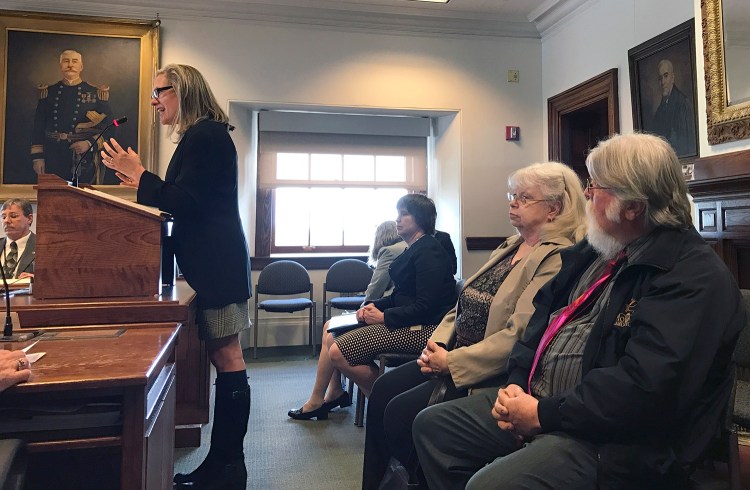AUGUSTA – Family members of William Dean, a Rockland man whose estate was liquidated by the state in 2013, appeared before lawmakers Wednesday in what could be their final attempt to settle a legal case that has dragged on for four years.
Claire Perry, Dean’s sister, and Pamela Vose, his cousin, each testified in favor of a bill that would allow them to bring a lawsuit against a surety bond held by the state when it served as Dean’s emergency conservator and guardian from September 2012 to March 2013.
In March, the Maine Supreme Judicial Court ruled against their suit against the Department of Health and Human Services, concluding that the state agency had sovereign immunity under the Maine Tort Claims Act. It had no opinion about whether the state mismanaged Dean’s assets, which the family alleges.
But the high court decision, according to Perry’s attorney, Cynthia Dill, suggested that there might be another path for Dean’s family – making a claim against the surety.
To do that, though, Dill needs the Legislature’s permission.
“I am not here to try and convince you that my client is entitled to judgment on the merits of her claims, or that the department broke the law or otherwise breached a legal duty – although I believe that to be true,” Dill told members of the Legal and Veterans Affairs Committee on Wednesday. “The questions of liability belong to a court of law where there are evidentiary rules in place to ascertain truth and deliver justice.”
William Dean, who died last October, lived for decades with Asperger’s syndrome, a form of autism that made it difficult for him to live on his own.
When his mother and caretaker died in early 2012, it sent him into depression that turned to mild psychosis. He was hospitalized in May 2012, first in Rockport and later at Dorothea Dix, a state-run psychiatric facility in Bangor.
After his hospitalization, the state applied for and was granted temporary conservatorship of Dean, even though Vose had expressed a willingness to be conservator. The state then sold one of his houses for less than half the assessed value, ostensibly to cover the cost of his care while hospitalized, which would have been thousands of dollars a month. It tried to sell the other house but only after failing to winterize it over the winter, which diminished its worth. It liquidated most of his possessions, including a concert-quality organ and several family antiques. It even approved the euthanizing of his companion, a 10-year-old Himalayan cat named Caterpillar.
“What happened to my cousin shouldn’t happen to any family in the state of Maine,” Vose said Wednesday.
The state has disputed some of the facts in the case – specifically whether Vose was prepared to act as conservator and whether it provided sufficient notification to family – but has generally been protected by sovereign immunity.
A lower court ruling that was overturned by the supreme court sided with Dean’s family.
“It seems clear that, had DHHS as Mr. Dean’s public conservator pursued a strategy aimed more at conserving his assets temporarily rather than liquidating them permanently, Mr. Dean would be much better off today,” wrote Judge Andrew Horton.
No one from DHHS appeared in person at Wednesday’s hearing but the department’s general counsel, Kevin Wells, sent a strongly-worded letter opposing the bill.
“(It’s) a blatant attempt to change the rules in the middle of the game and perform and end-run around the judicial process,” Wells wrote, adding that a suit against the department and a suit against the surety were essentially the same.
Dill, however, disagreed and some lawmakers seemed to agree.
She asked what the point of a surety bond, which is required when the state acts as a public conservator, would be, if not to provide protection if the state erred in managing someone’s finances.
“I think we need to learn more about the surety,” said Rep. John Schneck, D-Bangor. “If you can’t ever get to it because of sovereign immunity, why is it even there?”
Lawmakers will debate the bill at a work session later this month before voting whether to send to the full Legislature.
“Win or lose, this is our only path forward,” Perry said.
Teri McRae, a national certified guardian, reviewed the case and said it seemed pretty clear that the state mismanaged Dean’s estate. But she also wasn’t surprised the state didn’t accept responsibility.
“Of course the state won’t admit it did anything wrong because that would open up huge liability for them,” she said. “But I just can’t see why the state felt the need to move so fast in making these decisions.”
Wells, in his letter to lawmakers, acknowledged the state’s liability as well.
“Allowing the plaintiffs to do this would place the department and the state at serious disadvantage in assessing risks and liabilities in the future as well as undermining confidence in the fairness and impartiality of the judicial process,” he wrote.
Eric Russell can be contacted at 791-6344 or at:
Twitter: PPHEricRussell
Send questions/comments to the editors.


